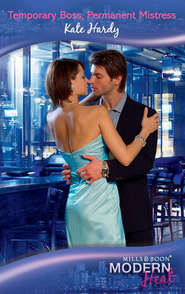По всем вопросам обращайтесь на: info@litportal.ru
(©) 2003-2024.
✖
The Doctor's Tender Secret
Автор
Год написания книги
2019
Настройки чтения
Размер шрифта
Высота строк
Поля
‘They’ll start seeing behaviour problems, and she’ll have problems coping with school.’
‘When’s it safe to drop the diet?’ Zoe asked.
‘In theory, once the brain has finished growing and developing. But it’s pretty controversial—I’d say right now it’s a long-term thing. For the rest of her life. And especially if she decides to have a family when she’s older—during pregnancy, if she doesn’t keep her levels stable it’ll expose the foetus to high levels of phenylalanine, which could cause birth defects, brain damage, or even a miscarriage.’
Good. It had worked. She’d headed him away from personal subjects and onto something safe.
She was just starting to relax again when he said, ‘So what are you doing tonight?’
Cleaning the house. Tackling the ironing mountain. Anything to stop herself thinking about Brad Hutton. ‘I’m meeting Tom.’
‘Tom?’
‘My boyfriend. The one I was telling you about,’ she gabbled.
He raised an eyebrow. ‘You don’t have a boyfriend.’
How did he know? Unless…No. Judith and Holly wouldn’t have told him. Surely they wouldn’t. ‘Yes, I do,’ she lied.
‘Zoe—’
‘And I’d better get going or I’ll be late for our date. It’s Friday night, after all. See you later.’ And she left before he had a chance to say anything else.
CHAPTER FOUR (#ulink_914de3d4-6515-574b-b40f-6eb681f05490)
ALTHOUGH they were both on duty that weekend, Zoe avoided Brad, except on the ward rounds—and she made sure that he didn’t get a chance to speak to her privately about anything.
It drove him bananas. What was it going to take to make her talk to him, tell him the truth? Because he still couldn’t work out why she was lying to him, why she was pretending to have a boyfriend. Had she been hurt by someone in the past and no longer trusted men? Or was it something about him that worried her? But, if so, what?
Judith and Holly were no help either. He tried asking them. They both shrugged and said, ‘Ask Zoe.’ Either they really didn’t know or they were protecting her. Either way, he was no further forward.
He was still brooding about it on the Monday afternoon—in the guise of doing paperwork in his office—when his phone rang.
‘Brad Hutton,’ he said, a little more brusquely than he’d intended.
‘Hello, Brad. It’s Jude. Sorry to bother you—I know you’re busy—but I need a paediatrician in Theatre. Like now. Can you send Zoe along, please?’
‘No can do.’
There was a second’s pause. ‘Why not?’
‘She’s in Theatre already.’
‘Oh, no.’ The dismay in Judith’s voice was palpable. ‘Is anyone else available?’
‘What’s up?’
‘I’ve got a mum with eclampsia.’
The world tilted sharply on its axis. Eclampsia. Of all the conditions Brad could have faced in the hospital, it would have to be that one.
‘Brad? We’re doing an emergency section because the baby’s in distress. I need someone over here. Fast,’ Judith prompted.
There wasn’t anyone else. He couldn’t drag Zoe out of Theatre without a lot of explanations he didn’t want to give. There was no point in paging his SHO, because she wouldn’t be back from her lunch-break on time to make it to Theatre. And he couldn’t leave something like this to a house officer who probably hadn’t ever seen a case of eclampsia and wouldn’t know what to look for in the baby.
So he had to face it himself.
Face the demon that had haunted him for nearly a year.
He felt as if he were talking through a mouthful of sawdust but he managed to force the words out. ‘OK. I’m on my way.’
‘Thanks. I’m in the delivery suite. Theatre Four,’ Judith told him.
Eclampsia. A bolt from the blue because it was impossible to predict who would get it. Although most cases of eclampsia developed from pre-eclampsia, there were also documented cases where the mother hadn’t had any signs of pre-eclampsia beforehand. Nobody really knew what caused pre-eclampsia either, though one theory was that it was an abnormality in the body’s immune response to pregnancy. It was once called toxaemia of pregnancy but nowadays was known by a longer name reflecting the symptoms, ‘hypertension of pregnancy with proteinuria’—in other words, high blood pressure plus protein in the urine.
It had certainly been a bolt from the blue for Lara. She hadn’t been in any of the high-risk groups and she’d had good antenatal care. There had been no family history of pre-eclampsia, she hadn’t had hypertension, kidney disease or systemic lupus erythematosus before her pregnancy, she had only been having one baby and there had been no problems with the foetus at all during her pregnancy.
Worse still, Lara hadn’t actually had pre-eclampsia. No signs of protein in her urine, no swollen fingers or ankles, no signs of high blood pressure. The first either of them had known about it had been when Lara had complained of a headache one afternoon at the office. And then she’d collapsed, had a seizure. By the time she’d been taken to the emergency department and Brad had been paged from Paediatrics, Lara had had two further seizures. Despite the best efforts of the team, the baby hadn’t had enough oxygen and she’d died in Lara’s womb. His beautiful daughter, the little girl they’d both so looked forward to meeting—dead.
Bile rose in Brad’s throat. As if losing his daughter hadn’t been enough, that day had turned into his worst nightmare. Because, along with just over a third of women with eclampsia, Lara had developed a complication after delivering their baby. The most common one—a brain haemorrhage—and also the most fatal one.
And so he’d had to arrange a double funeral. His wife and his child. Two coffins—one of them impossibly tiny—that together had contained his whole life. Ashes to ashes, dust to dust…
He shook himself. He couldn’t go to pieces. Not now. He was a professional, a paediatric consultant, and he had a job to do. He had to look after this baby. Make sure that this one didn’t die like Cassandra had.
He scrubbed up and went into Theatre Four.
‘Thanks for making it so fast, Brad,’ Judith said. ‘This is Susie Thornton. She’s thirty-seven weeks, it’s her first baby and she’s thirty-seven.’
Worse and worse. Exactly the same as Lara had been when she’d died. Three years older than he was. First baby, thirty-seven weeks gestation.
‘She had moderate pre-eclampsia so we’ve been keeping a close eye on her on the ward for the last couple of weeks. She’s been on bed rest and antihypertensive drugs. She had a bit of a headache, then said it hurt just under her ribs and she thought it might be contractions.’
Brad forced the words through his dry lips. ‘And then she had a seizure?’
Judith nodded. ‘Textbook case, according to the midwife—thank God she was in the room at the time. Susie stopped breathing, her face twitched, her body became rigid and her muscles started contracting. Then phase two. Convulsions started in her jaw, moved through the muscles of her face and eyelids and spread through her body. The whole thing lasted for just over a minute. She was unconscious for a couple of minutes afterwards, and started hyperventilating when she came round—though she couldn’t remember collapsing or having a fit.’
Neither had Lara. When he’d been in the emergency department with her, holding her hand, she’d been distraught. ‘What’s happening to me, Brad? What happened? I—I can’t remember anything. I want our baby to be all right. Promise me our baby will be all right. Don’t let anything happen to her.’
Her words echoed through Brad’s head, over and over. Promise me. And, being a hotshot paediatrician, he’d promised. Of course their baby would be all right. He wouldn’t let anything happen to their precious child.
And when it had come to the crunch, he hadn’t been able to do a damned thing.
He realised that Judith was still talking him through her patient’s history.
‘We cleared her airway, made sure she had enough oxygen and put her on her left side so there was a good blood flow to the baby. She’s had intravenous magnesium sulphate to prevent any further seizures—it’s better than intramuscular, which hurts and leads to abscesses, plus it helps the blood flow to the foetus. I asked for ten-minute obs on her blood pressure and regular checks on proteinuria. I thought she’d stabilised and I was planning to give her oxytocin to induce labour. Susie really wanted a natural birth. But we were monitoring the foetal heart rate, too, and the baby went into distress. Probably because of the antihypertensives. My consultant agreed that we had to deliver. Now.’
‘Sure.’ Brad’s voice was hoarse with effort. ‘You’d better keep an eye on her afterwards. In case there’s a…’ He couldn’t say it. Couldn’t say the words that had broken his heart. An intracranial bleed.











